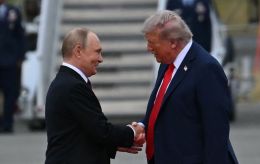Georgia's European integration almost halted due to foreign agents law - EU Ambassador
 Photo: Georgia's integration into the EU is almost halted due to foreign agents law (Getty Images)
Photo: Georgia's integration into the EU is almost halted due to foreign agents law (Getty Images)
Georgia's integration into the European Union is almost halted due to the adoption of a controversial law on foreign agents by the country's parliament, according to EU Ambassador to Georgia Pawel Herczynski.
According to him, an extremely difficult period has come in the relations between Georgia and the EU.
"We have repeatedly said that the law on Transparency of Foreign Influence would have a negative impact on Georgia's European integration efforts. Unfortunately, this has happened," Herczynski said.
He explained that the European Union's response to the adoption of the law on foreign agents in Georgia will be discussed at the level of foreign ministers in Luxembourg next week, then in a few days at the level of leaders - presidents and prime ministers of EU member states.
"The adoption of this law, in my opinion, has frozen Georgia's European integration. As you know, integration into the EU requires unanimity, and you have already heard public statements from several member states that they are not ready to start negotiations with Georgia if this law remains in force," the ambassador said.
Herczynski emphasized that "this is happening against the backdrop of the start of accession negotiations with Ukraine and Moldova."
"It is very disappointing to see that Georgia's integration into the EU is practically suspended, frozen, while we are moving forward with Ukraine and Moldova," the diplomat added.
What happened before
On May 28, the Georgian parliament overrode President Salome Zurabishvili's veto of the controversial law on Transparency of Foreign Influence. After that, the law was adopted.
This step outraged our Western partners. In particular, we recently reported that the European Union is preparing a response after the Georgian parliament finally passed the law on foreign agents.
Recently, Radio Liberty correspondent Rikard Jozwiak reported on a document from the European Commission that outlines the steps the EU can take in response to the adoption of the law on foreign agents in Georgia.
These include personal sanctions, suspension of financial assistance, and, in extreme cases, temporary suspension of the visa-free regime and suspension of the country's European integration.

